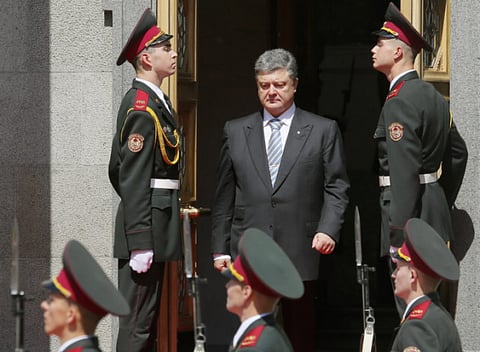Time for EU and Ukraine to put their houses in order
Ukraine’s election became a focal point for reconstruction. The EU Parliament election, by contrast, was an exercise in disruption

Europe recently experienced two watershed elections, with very different outcomes. Whereas Ukraine’s presidential election has been widely hailed as the end of the beginning of Ukraine’s political transition, the European Parliament election has been lamented as the beginning of the end of the idea of an ever-closer union. The polls, both held on May 25, not only provide insight into the mindset of the respective electorates; the behaviour of each electorate also offers important lessons for the other.
Ukraine’s election was shaped by an acute awareness of the risks facing the country. Following the “Euromaidan” revolution — which brought about the demise of President Viktor Yanukovych’s government — and a four-month interim administration, this election centred on change. Yet Ukrainians’ chosen president, Petro Poroshenko, is the very embodiment of the establishment, having served as Economics Minister under Yanukovych and Foreign Minister under his predecessor, Viktor Yushchenko.
This is not as surprising as it might seem. Ukrainians were making a sober decision, voting with their heads, not their hearts. Indeed, polls indicate that Poroshenko’s appeal lay largely in his focus on immediate internal challenges. By contrast, his rivals, most notably Yulia Tymoshenko, emphasised a rapid shift toward Nato and the European Union.
Ukrainians also eschewed the temptations of populism and extreme nationalism. The poor performance of the right-wing Svoboda and Right Sector candidates — which together won less than 2 per cent of the vote — should finally quash Russian assertions of a fascist regime in Kiev.
Ukrainians hope that Poroshenko, with his moderate approach and willingness to negotiate, will be better equipped to resolve the country’s perilous security situation than his more ardent rivals. While Russian President Vladimir Putin has recently toned down his rhetoric, violence persists — a clear indication of the challenge that lies ahead. Indeed, Ukraine remains on the verge of becoming a failed state.
Security may be the most pressing issue, but it is certainly not the only one. Poroshenko’s government must also reinvigorate and strengthen Ukraine’s economy. Doing so requires, first and foremost, measures to halt the decline in foreign direct investment, which fell by 30 per cent from 2012 to 2013. Improved governance is also critical — no small challenge for a country that ranks 144th on Transparency International’s Corruption Perceptions Index, alongside Iran and Nigeria.
Feeding on discontent
Ukraine’s election became a focal point for reconstruction. The outcome was driven by voters’ recognition of their country’s fundamental problems — starkly apparent in the tents that remain on Maidan Square, the loss of Crimea, and the separatist violence in Donbas — and their desire for an effective government to address those problems. The next step in this process — a parliamentary election — should occur as soon as possible.
The European Parliament election, by contrast, was an exercise in disruption. Support for far-right and far-left parties was based on citizens’ frustrations with Europe’s flaws, rather than on any realistic, thoughtful agenda.
Populists and Eurosceptics fed on the discontent of those who have felt neglected by EU institutions, and now believe that the benefits of the European project, such as freedom of movement, no longer outweigh the burdens, like immigration and austerity. There is growing reticence among Europeans about further integration, owing largely to fears that ever-closer union will diminish national identity.
Of course, the notion of returning to the pre-EU world is fundamentally flawed, owing to the simple fact that individual European countries cannot compete in the modern global economy. Nonetheless, a sense of nostalgia drove many voters’ decisions. Simply put, Europeans voted from the heart. What Europe needs is serious debate, not emotional reactions. The problem is that the European Commission and the European Parliament have consistently failed to generate a compelling narrative, leaving ordinary Europeans unconvinced of the EU’s value. Making matters worse, national and European leaders have allowed — even encouraged — citizens to believe that integration is inevitable, lowering the stakes for European elections.
This is where the Ukrainian election can offer a critical lesson to the EU, despite the vast differences between the challenges that they face. The European project is a complicated and ambitious endeavour, the viability of which depends on constant care and adjustment. Unless Europeans recognise that the Union is not a given, and acknowledge the value of the prosperity and security that it provides, the recent election may come to be seen not as a wake-up call, but as a swan song for the integration project.
The European election’s outcome also has a powerful message for Ukraine: there are limits to its European prospects. To be sure, Ukraine has a strong partner in the EU – particularly if its government responds effectively to voters’ call for improved governance. But, whatever Ukraine achieves, it cannot overcome Europeans’ fears of further integration, much less enlargement. That is up to Europe.
In the meantime, Ukraine must focus on building a functioning relationship with Europe. To push for more, such as by requesting membership in the EU or Nato, would be a tactical mistake.
In this sense, the lesson of the May 25 elections is the same for both Ukraine and the EU: it is time for each to put its own house in order.
— Project Syndicate, 2014
Ana Palacio, a former Spanish foreign minister and former Senior Vice President of the World Bank, is a member of the Spanish Council of State and a visiting lecturer at Georgetown University.
Sign up for the Daily Briefing
Get the latest news and updates straight to your inbox



